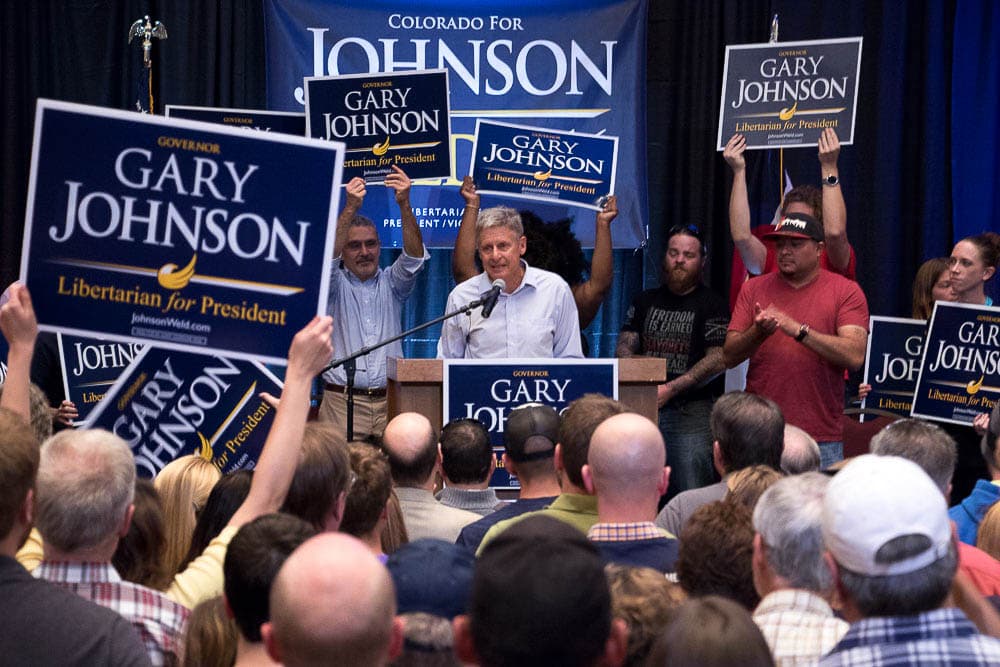The story of this election is not shaping up to be a story of third-party voters siphoning support from Hillary Clinton. That said, Clinton lost Florida to Donald Trump by 132,000 votes, and 203,000 people in that state voted for Libertarian Gary Johnson. In Michigan, Clinton lost to Trump by 16,000 votes and more than 200,000 people voted for Johnson.
In Colorado, with roughly 64 percent of the vote counted, Clinton's victory was secured with 54,696 votes, and 115,000 people voted for Johnson.
So how do third-party voters feel about their choice now?
Jacob Gore, a software engineer in Centennial, had a Johnson/Weld sign in his yard, but he held on to his ballot until Tuesday morning, vacillating between Clinton and Johnson. He liked Johnson's positions, but he didn't want to cast a vote that could help deliver Colorado to Trump.
In the end, he voted for Johnson.
"I was running out of time to decide, and the polls were not changing," Gore said. "The thought process was, unless the situation was Trump wins Colorado by one vote, I would feel bad about not voting for the candidate who best represents my views, the candidate that I think should be president."
Gore said the demographics of Johnson's supporters -- some of them Republicans who looked for an alternative to Trump, some of them former supporters of Vermont Sen. Bernie Sanders, some of them with long-standing Libertarian leanings -- makes it hard to say which candidate was hurt more by Johnson's presence in the race.
"Considering the intense dislike both major candidates garnered in this election, I think after all the data is collected and analyzed, it will show a smaller percentage of the third-party voters were pulled away from Clinton, and a larger percentage would not have voted at all," he said in a follow-up email. "Maybe after all that is taken into account, it may indeed turn out that without Johnson, or maybe without all third-party candidates put together, Clinton would have won Florida. But I don’t think that assumption is warranted right now."
Shawn Coleman, a marijuana industry lobbyist who lives in Boulder, said he never saw the election as a choice between likely outcomes.
"The whole point of an election as I understand it is that I should vote for the person I want to win," he said. "It’s not a casino. I’m not betting."
Unlike Gore, Coleman is a registered Democrat who supported Sanders in the primary. A lot of people have asked how people who supported a Socialist can support a Libertarian.
Coleman said voters don't hold monolithic views that graft neatly onto each party.
"I supported Bernie Sanders because I believed in the principles he supported. Not all of them, but many of them," he said. "If he were the nominee of the party, I would have voted for him. But that didn't mean I don’t support the Libertarian principles of Gary Johnson. There is some consistency in the West in being a Democrat and having Libertarian principles of states’ rights and limited international intervention."
"We’re seeing on an increasing level that Venn diagram that creates new alliances," he added.
As someone who works in the cannabis industry, Coleman said he couldn't vote for Clinton because she threatens his livelihood. Moving marijuana to Schedule II would mean expensive FDA trials.
Would Clinton really be worse than Trump?
"I was not contemplating a Donald Trump presidency. I was contemplating the outcome I wanted," he said. "I think we need to think about the message the American people are sending to our government. As a black man living in America, I don’t believe 49 percent of the country is racist. What I believe this election will have been about is more about folks feeling disenfranchised from the political establishment."














